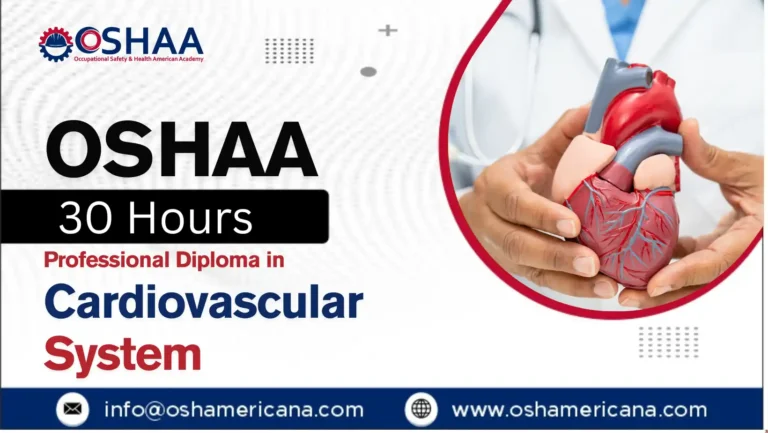Medical laboratory technicians play a crucial role in modern healthcare by conducting essential diagnostic tests that aid in patient care and treatment. The OSHAA 30-Hours Diploma in Medical Laboratory Technician Training is designed to equip participants with the fundamental knowledge and practical skills needed to work in clinical laboratories.
Medical laboratories are vital to diagnosing diseases, monitoring patient health, and ensuring effective treatment plans. Well-trained laboratory technicians help healthcare professionals make informed decisions by conducting precise and reliable tests.
The OSHAA 30-Hours Diploma in Medical Laboratory Technician Training provides a structured approach to learning fundamental laboratory skills. Participants will gain insights into laboratory operations, specimen handling, and the principles of medical diagnostics.
The OSHAA 30-Hours Diploma in Medical Laboratory Technician Training is an essential qualification for those looking to build a career in laboratory sciences. With a focus on diagnostic procedures, laboratory safety, and quality assurance, this course provides the foundational knowledge and skills required for success in medical and research laboratories. Whether you are starting your career or seeking to enhance your laboratory expertise, this diploma will help you develop the competency needed to excel in the field of medical diagnostics.
OSHAA 30-Hours Diploma in Medical Laboratory Technician Training
Study Units
Learning Outcomes
Introduction to Medical Laboratory Science (3 Hours)
- Understand the role of medical laboratory technicians in healthcare and diagnostics.
- Learn about different types of laboratory tests and their significance in disease diagnosis.
- Recognise the structure and functions of a medical laboratory.
- Develop an understanding of laboratory ethics, professionalism, and confidentiality.
Laboratory Safety, Infection Control, and Biohazard Management (4 Hours)
- Understand laboratory safety protocols, including handling hazardous materials and biohazards.
- Learn infection control measures to prevent contamination and cross-infection.
- Recognise the importance of personal protective equipment (PPE) in laboratory settings.
- Develop skills in waste disposal, chemical handling, and emergency response procedures.
Specimen Collection, Handling, and Processing Techniques (4 Hours)
- Learn proper techniques for collecting blood, urine, and other biological samples.
- Understand best practices for specimen labelling, storage, and transportation.
- Develop knowledge of factors that affect specimen integrity and test accuracy.
- Gain an understanding of ethical considerations and patient consent in specimen collection.
Fundamentals of Haematology and Blood Analysis (6 Hours)
- Understand the composition and function of blood in human physiology.
- Learn the principles of haematology testing, including complete blood count (CBC) analysis.
- Develop skills in blood smear preparation and microscopic examination.
- Recognise common blood disorders and their laboratory diagnosis.
Microbiology and Infectious Disease Testing (4 Hours)
- Understand the role of microbiology in diagnosing infectious diseases.
- Learn techniques for culturing, staining, and identifying microorganisms.
- Develop knowledge of antimicrobial susceptibility testing and its importance.
- Recognise safety protocols for handling infectious specimens in the laboratory.
Clinical Chemistry and Biochemical Analysis (4 Hours)
- Learn the principles of biochemical testing for metabolic and organ function assessment.
- Understand the role of laboratory tests in diagnosing conditions such as diabetes and liver disease.
- Develop skills in analysing blood glucose, cholesterol, and enzyme levels.
- Recognise factors affecting the accuracy and reliability of biochemical tests.
Use and Maintenance of Laboratory Equipment (5 Hours)
- Learn how to operate and maintain essential laboratory instruments.
- Understand calibration, quality control, and troubleshooting of lab equipment.
- Recognise the importance of proper equipment handling to ensure test accuracy.
- Develop skills in maintaining records and documentation for laboratory equipment management.
- Comprehensive Laboratory Skills – Gain hands-on knowledge of essential laboratory procedures, including specimen collection, blood analysis, and biochemical testing.
- Improved Career Prospects – Enhance employability in medical laboratories, hospitals, diagnostic centres, and research institutions.
- Strong Understanding of Laboratory Safety – Learn crucial safety protocols, infection control measures, and biohazard management to ensure a secure working environment.
- Accuracy and Quality Assurance Training – Develop skills in maintaining precision in diagnostic testing, reducing errors, and following quality control standards.
- Practical Knowledge of Haematology and Microbiology – Understand the fundamentals of blood analysis and microbiological testing for disease diagnosis.
- Enhanced Equipment Handling Skills – Learn how to operate, maintain, and troubleshoot laboratory instruments, ensuring efficiency in medical testing.
- Ethical and Professional Development – Understand laboratory ethics, confidentiality, and professional responsibilities in medical diagnostics.
- Flexibility and Career Advancement – Suitable for aspiring medical laboratory technicians, healthcare professionals, and students seeking further education or career progression.
- Contribution to Patient Care – Play a critical role in healthcare by ensuring accurate and timely diagnostic results for effective treatment planning.
- Recognition and Certification – Earn a professional qualification that validates laboratory expertise and enhances credibility in the field.
The OSHAA 30-Hours Diploma in Medical Laboratory Technician Training is designed for individuals who want to build or enhance their skills in medical laboratory science. This course is ideal for:
- Aspiring Medical Laboratory Technicians – Individuals looking to start a career in clinical laboratories, diagnostic centres, or research institutions.
- Healthcare Professionals – Nurses, paramedics, and healthcare assistants seeking to expand their knowledge of laboratory diagnostics and testing procedures.
- Laboratory Assistants and Support Staff – Those currently working in laboratory settings who want to formalise their training and improve their technical expertise.
- Biomedical and Life Sciences Students – University or college students pursuing studies in medical sciences, biology, or healthcare-related fields who want hands-on laboratory training.
- Research and Pharmaceutical Professionals – Individuals working in research labs or pharmaceutical companies who require laboratory knowledge for testing and quality control.
- Healthcare Administrators and Supervisors – Professionals managing medical facilities who need a deeper understanding of laboratory operations, safety, and compliance standards.
- Public Health and Pathology Staff – Individuals involved in disease control, diagnostics, or public health services who require knowledge of microbiology and specimen analysis.
This course is suitable for both beginners and those with some prior experience in laboratory settings, offering essential knowledge and practical skills needed for a successful career in medical laboratory science.







